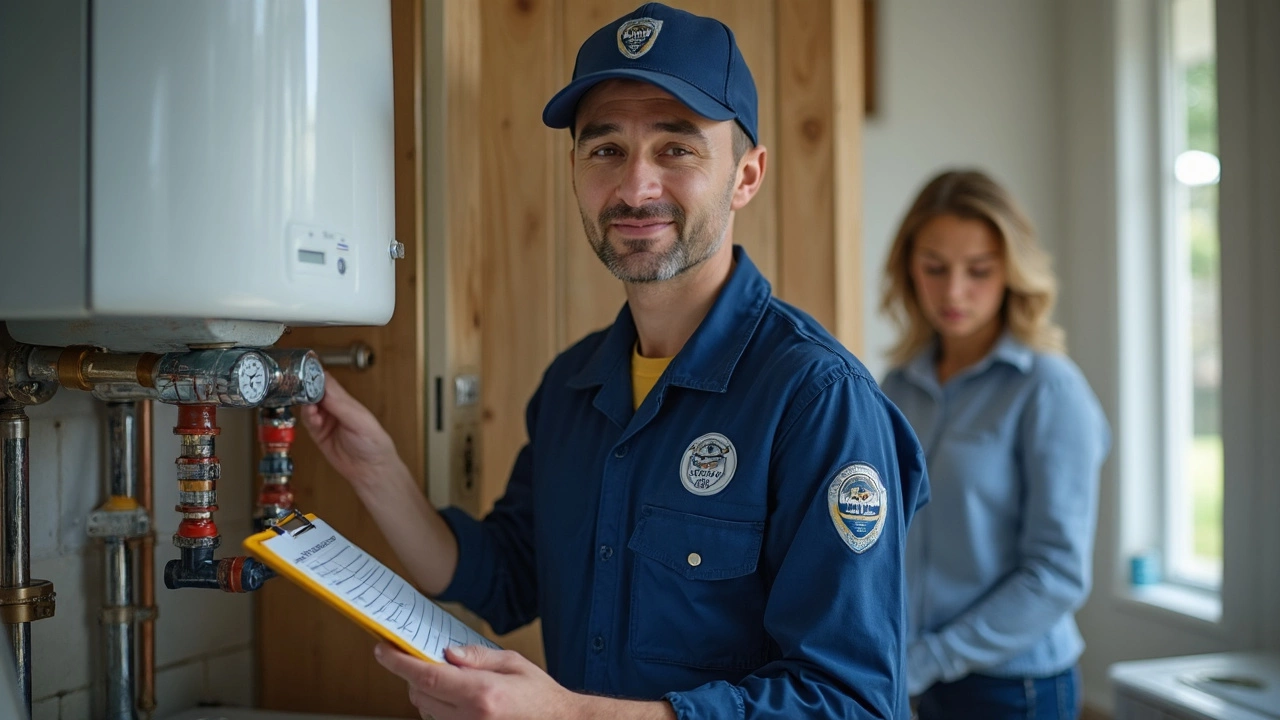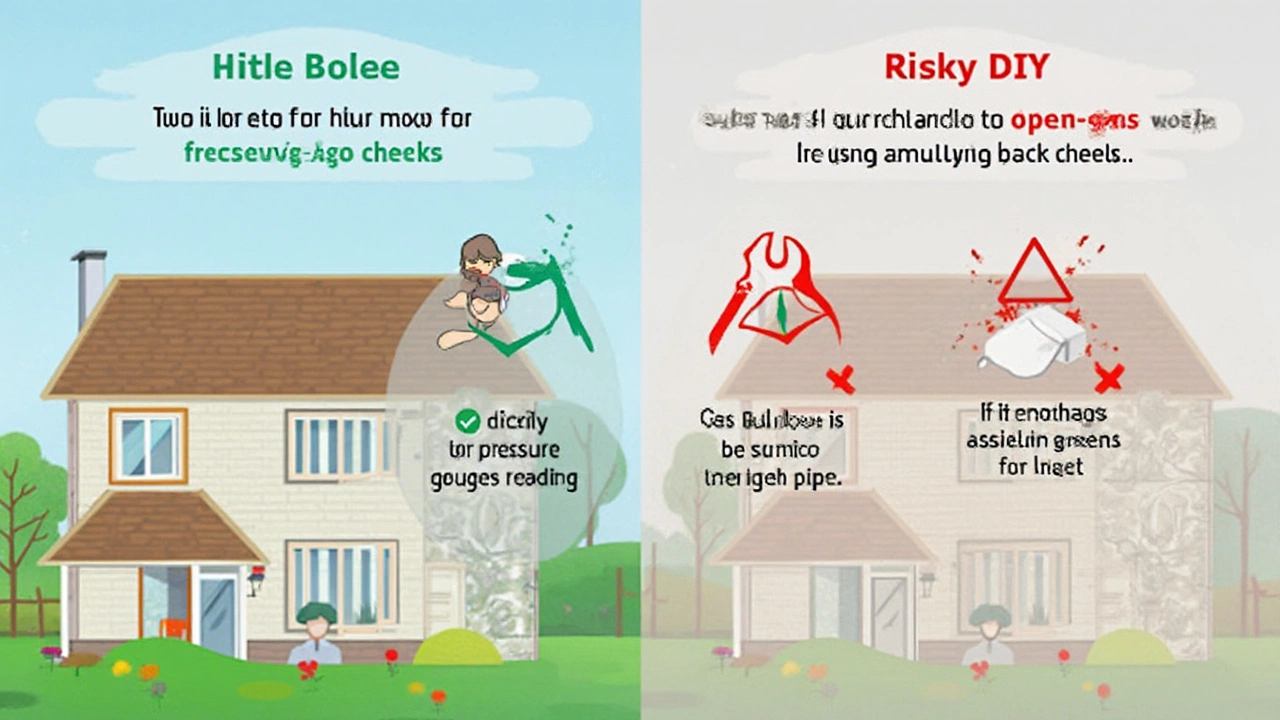Ever wondered if you could just service your boiler yourself and skip the annual call-out fee? You’re definitely not alone. Boilers look simple on the outside—just a few knobs and pipes, right? But inside, they're more complex than most people realize, and messing around without knowing what you’re doing can land you in a heap of trouble.
There’s a real difference between giving your heating system some basic TLC and actually servicing it. Most DIY boiler work beyond simple visual checks is actually illegal if you’re not properly qualified. That doesn’t stop thousands of people from trying every year—they'll tell themselves it's just a filter clean or a pressure tweak. Trouble is, get it wrong and you risk gas leaks, carbon monoxide poisoning, breakdowns, or even legal fines.
If you're genuinely keen on doing something yourself, you want to know what jobs are low-risk and which ones should have a big, red 'Don't Touch' sticker. It isn't just about confidence with tools—there's a real safety and legal side here you can't ignore. Stick around as we unpack what you can check yourself, where you need to stop, and why calling a pro isn’t just for scaredy-cats. Knowing the difference could actually save you a fortune—or a life.
- What DIY Boiler Servicing Really Means
- Jobs You Can Tackle vs. Jobs to Avoid
- The Legal and Safety Side: Serious Stuff
- Simple Checks You Can Actually Do
- When to Stop and Call an Expert
What DIY Boiler Servicing Really Means
DIY boiler servicing isn’t the same as what a certified engineer does on a payday visit. A real service includes checking the flue for blockages, testing gas pressures, taking apart key parts, and making sure the system is safe—stuff you can't legally or safely do without special training.
Let’s lay it out: in the UK, by law, only Gas Safe-registered engineers can work on gas boilers. There’s a good reason. Gas leaks, faulty pressure, and dodgy electrics are serious business. Every year, around 60 people die from accidental carbon monoxide poisoning across England and Wales, and dozens more are hospitalized. That’s not worth risking for a bit of DIY pride.
If you’re wondering what counts as “servicing” versus basic maintenance, here’s a handy breakdown:
- Boiler service: Deep inspection, cleaning burners, checking emissions, safety tests, system pressure checks—requires full training.
- Basic maintenance: Bleeding radiators, topping up system pressure (if you understand your manual), and gently dusting the outer case. No special training needed here.
To put it in perspective, here’s what typically happens at a proper annual service versus the small jobs you can legally do yourself:
| Task | Certified Engineer | You (DIY) |
|---|---|---|
| Check gas pressure and flow | Yes | No |
| Flue safety check | Yes | No |
| Clean main burner | Yes | No |
| Visual leak inspection | Yes | Yes |
| Bleed radiators | Yes | Yes |
| Top up system pressure | Yes | Yes |
| Test all safety devices | Yes | No |
So, when people ask about doing their own boiler service, most of the time what they mean is just supporting their system with simple checks or a quick clean, not an actual service. The truth? If the job needs a screwdriver or any internal part touched, that’s off-limits. Stick to what’s safe: your user manual will tell you what you can do, and it pays to read it, because every boiler model is a bit different.
Jobs You Can Tackle vs. Jobs to Avoid
Here’s where most folks get tripped up: what’s actually safe and legal for you to do on your own boiler? Spoiler alert—not a lot, but there are a few things you can manage without risking your home or breaking the rules.
Boiler service—the kind that keeps warranties valid and your home safe—mostly needs a trained pro. In the UK, only engineers on the Gas Safe Register can legally open the case and start poking inside. If you mess with gas components and you’re not registered, you could get fined up to £6,000 or even end up with a criminal record.
So, what can you do? Here’s the practical list:
- Check your boiler pressure: Most boilers work best when pressure sits between 1 and 2 bar when cold. If it’s low, you can usually top it up following the manual. But if it won’t hold pressure, that’s a job for an expert.
- Bleed radiators: If your radiator’s cold at the top and hot at the bottom, air’s trapped. Grab a radiator key and a towel, turn the screw just enough for air to hiss out, then close it when water appears. This improves heating and can take some load off your boiler.
- Visual health checks: Look (don’t touch) for signs of leaks, rust, or alarming noises. Spotting these fast can save a small fortune in repairs.
- Keep vents and flues clear: Make sure nothing’s blocking outside vents or the flue so gases can vent safely. No leaves, no clutter—simple but vital.
That’s about the limit. Avoid anything that means taking the boiler cover off, adjusting gas valves, or touching electrics. As the Gas Safe Register makes very clear:
"You should never attempt to repair or service a gas appliance unless you are Gas Safe registered. It’s not just dangerous, it’s illegal."
Cleaning or replacing parts inside the boiler isn’t just tricky, it can be flat-out dangerous—carbon monoxide is invisible and deadly if you do something wrong. This is also why DIY boiler work often voids warranties and home insurance. Bottom line: checks and minor tweaks, sure. Actual repairs or deep cleaning? Call a pro, every time.

The Legal and Safety Side: Serious Stuff
This is where things get real. The law doesn’t mess around when it comes to boilers, especially gas ones. In the UK, for example, you need to be on the Gas Safe Register to actually service, repair, or replace anything inside your boiler. It’s not just a suggestion—it’s the law. If you’re caught tinkering inside your boiler and you’re not registered, you can face a fine of up to £6,000 or even jail time if something goes really wrong.
The same sort of rules apply in lots of other countries, too. In the US, for example, many states require a certified HVAC technician to do more than basic maintenance. That’s because messing with boilers can go badly wrong—think carbon monoxide leaks or explosions. In 2023, UK gas safety data showed over 80% of carbon monoxide poisoning incidents at home were linked to appliances serviced by someone unqualified.
It isn’t just about legal fines—your home insurance can get thrown out the window too. If you’ve messed with your boiler without the right qualifications and something happens, your insurance company probably won’t pay out. Suddenly, that DIY fix could cost you a small fortune.
| Rule | Detail |
|---|---|
| Gas Safe Register Required | UK, for any gas boiler repair or service. |
| Certification Needed | Most US states require HVAC certification; check your local rules. |
| Insurance Risk | DIY work can void home insurance if a boiler is involved. |
| Penalties | Fines up to £6,000 and potential jail time (UK). |
| Common Risks | Gas leaks, carbon monoxide poisoning, fire. |
So, the biggest takeaway here is simple: Just because you feel brave and handy, doesn’t mean you should pull out the toolkit for anything that qualifies as actual boiler service. Know your limits, follow the rules, and never put your safety (or your family’s) on the line for the sake of saving a bit of cash.
Simple Checks You Can Actually Do
Wondering what you can safely do with your boiler before calling in a pro? There are a few checks and quick TLC jobs you can handle that won’t get you into trouble or break any rules. These can actually help your boiler run better and avoid the most obvious breakdowns.
Here’s what’s okay for pretty much anyone to tackle:
- Boiler service doesn’t mean playing with gas or opening up the inside. It’s about things like glancing at the pressure gauge once in a while. Your pressure should sit between 1 and 1.5 bar when the system’s cold. If it's outside that range, jot it down or take a picture and show it to a heating engineer—don’t just start bleeding radiators or topping up water wildly.
- Check for leaks or damp patches. Scan around the boiler and nearby pipes for drips or stains. Spotting a leak early can save you from a bigger headache later, but don’t try to patch up anything yourself—just note what you see and flag it fast.
- Listen for weird noises. Boilers make a gentle whoosh and some clicking when starting up, but banging, gurgling, or constant whining can mean there’s a problem. Write down what you hear and when it happens, since this helps the engineer find the root cause. Ignore the noise, and you’re risking a breakdown or higher repair bills.
- Check the pilot light or digital display. No flame or a strange color (yellow is a big red flag) means something’s up. Modern boilers have error codes—grab the manual, find out what the code means, and let the pros know.
- Clear the area around your boiler. Don’t treat it like a cupboard. Piling things up can make the unit work harder by blocking ventilation and is a flat-out fire risk. Give it some breathing space.
These checks won’t fix major issues, but they give you a head start. Even big energy companies, like British Gas, say that doing these small jobs regularly can prevent common faults—and a lot of engineers wish more customers did them.
So, keep your eye out, use your ears, and don’t be afraid to take notes. Just don’t open up the case or start any repairs yourself. If anything feels off, call an expert—no shame in playing it safe when gas and hot water are involved.

When to Stop and Call an Expert
Knowing when to wave the white flag and bring in a pro isn't just smart—sometimes it's your only safe option. Boilers might seem easy enough to handle after you’ve watched a few online walkthroughs, but the reality is, there are strict rules about who can actually open one up.
The most important thing to remember? If your boiler runs on gas, UK law says only Gas Safe registered engineers can service, repair, or open it up. Even small slip-ups can lead to gas leaks or carbon monoxide—and that’s not something to play with. And if you ignore that and something goes wrong, your home insurance probably won't protect you.
Here’s a quick way to know when you need a proper boiler repair expert, not just a YouTube video:
- You smell gas near the boiler or hear hissing noises (both major red flags—evacuate and call emergency services, then a Gas Safe engineer).
- Your boiler keeps switching itself off, losing pressure, or showing weird error codes that don’t reset after a simple restart.
- There’s water pooling under or inside the boiler casing—water + electrics is never a good mix.
- You see any scorch marks, black soot, or notice the flame has turned yellow instead of blue (signs of dangerous carbon monoxide production).
- Annual servicing is due—this isn’t worth skipping, and it keeps warranties valid.
Don’t get tricked into thinking you’re saving money by risking it. According to Gas Safe Register stats for 2024, over 1 in 5 illegal boiler jobs led to an unsafe situation in the home. Here’s how the risks stack up, just by the numbers:
| Situation | DIY Risk Level | Professional Required? |
|---|---|---|
| Gas leak suspected | Extremely High | Yes |
| Weird noises or constant pressure drops | High | Yes |
| Bleeding radiators, topping up pressure (as per manual) | Low | No (if confident and safe) |
| Opening boiler casing | Very High (Illegal for non-registered) | Yes |
| Annual safety/service checks | High (if attempted DIY) | Yes |
Bottom line—stick to surface maintenance and visual checks if you’re not trained and registered. For everything else, bringing in a boiler service expert keeps you legal, safe, and usually costs less than fixing a botched attempt. Don’t let pride get in the way of safety.

I am an expert in the services industry with a focus on appliance repair. My passion lies in understanding how things work and educating others in simple, engaging ways. This enthusiasm fuels my writing, where I delve into topics around appliance maintenance and troubleshooting. I aim to make these subjects clear and accessible to all readers.